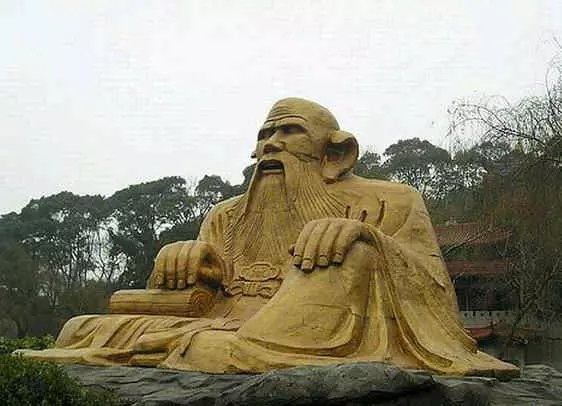Taoism is ancient teaching about the device and the world order of things in the universe. The founder of Taoism is the Chinese sage of Lao Tzu. It is known that the Taoists preach the principle of non-interference in the course of events, based on faith in improving the world's management of the law. What was the contemplation of Taoism, what practitioners offer us this teaching? Consider the question in the article.

Taoism and contemplation
What is contemplation? This is the state of inner peace and complete non-interference in what is happening. This is the knowledge of the nature of activity, which is hidden by the secret meaning of being. Daoists believe that any active action of a person violates the absolute harmony of the perfect world and is a waste of energy and strength. The philosophy of Taoism is the concept of comprehending the perfection of the world through meditation, and not good and correct actions."If you look, lose. Do not look for, then you will find. " This was told by the teacher Lao Tzu. Only inaction and contemplative passivity can lead to the acquisition of happiness. According to Lao Tzu, any impact on the world of things will only lead to loss and disappointments. The human activity is considered by Daus as an attempt on the perfection of the universe, because only Tao (universal law) has prerogative on any changes and changes. The human task is to contemplate the effect of Tao and not oppose the changes, they caused.
Find out what awaits you today - a horoscope for today for all zodiac signs
By numerous subscribers requests, we have prepared an accurate horoscope application for a mobile phone. Forecasts will come for your zodiac sign every morning - it is impossible to miss!
Download free: Horoscope for every day 2020 (Available on Android)
Connectivity in Taoism is considered the best and reasonable effect. It is impossible to interfere in public affairs, one cannot disturb the uniform order of nature. The path of non-interference and harmonious unity with the world provides a long life and spiritual immortality.
The principle of non-interference
What does "notion" mean (U-Wei) in Taoism? It is in mind not complete indifference and inaction, but the lack of the initiative can be changed and improved. Daoists believe that the world is harmonious and perfect and any influence on it is destroyed by harmony and unity. The best translation of the word "U-Wei" will be "non-interference."

Navigation is a way to know the world, and not idle lifestyle. The principle of this concept is concluded in the following concepts:
- contemplative passivity;
- surprise;
- spontaneity.
Navality applies not to complete inaction of the individual, but to his wish to master the world or correct something at its discretion. The Tao philosophy argues that the world manages the unified law of change. If a person begins to interfere in this law with its unreasonable actions, then the result will only attract problems in his life.
What is spontaneity and surprise? These concepts say that the actions of a spiritually developed person are not planned to mind, as the mind can lead to a false way. Enlightened Dao comes according to the circumstances, not trying to analyze the causes and consequences of this event.
That is, contemplation and notion in Taoism is a refusal of logic and reflection, which is manifested in the activity of the mind. In Taoist practices there are meditation to "devastation" of the mind from the jumping thoughts. Chaotic mental activity cannot lead a person to a reasonable solution, because the mind is intended to ensure mechanical actions - raise the hand, go somewhere, etc.
When a person refuses to search for solutions through its own logic, issues of issues are carried out by themselves. In this, contemplative passivity is manifested. When a person has no reasons for action (desire, calculations), any action occurs unexpectedly and spontaneously. Only then will be effective.
Note! Lao Tzu taught that to subordinate the world to his will is tantamount to his destruction. The world is sacred and cannot be captured by an individual.
Taoism preaches contemplative attitude to life, immersion in the inner world and knowledge of the world through an internal immersion. That is, Taoism is proposed to contemplate not an external, but its own inner world, and to comprehend the perfection of the universe through it.

Meditative contemplation
Consider the Taoist practice of contemplation. To comprehend the harmony of the world order, you need to focus on your inner world and observe the course and change of thoughts and images. Watch how they appear and disappear, your feelings from this process. Gradually, you are aware that the reason for the appearance of all thoughts is the activity of the mind.
It is your mind that creates thoughts that are the source of all problems. Dao offers to free the mind from thoughts, and then you will notice - with them disappeared and your problems! When you master this practice, go to the next one - the prevention of the appearance of thoughts. How to do it? You must not allow thoughts to appear. You have already learned the nature of mental activity and understand how thoughts appear in the head, "just do not let them appear.
When you free your mind from thoughts, you will feel the inner peace. In this state, the world is perceived quite differently, all emotions are balanced, and a feeling of harmony appears. Internal harmony manifested themselves due to the suppression of a chaotic thoughts.
Do I need to read any mantras in this practice or focus on something? No, internal contemplation passes in complete silence. This practice can be applied anywhere and in any position - sitting, lying, while walking. Over time, you will get used to this practice and you will experience the need for the liberation of the mind from the chaos of thoughts and images.
